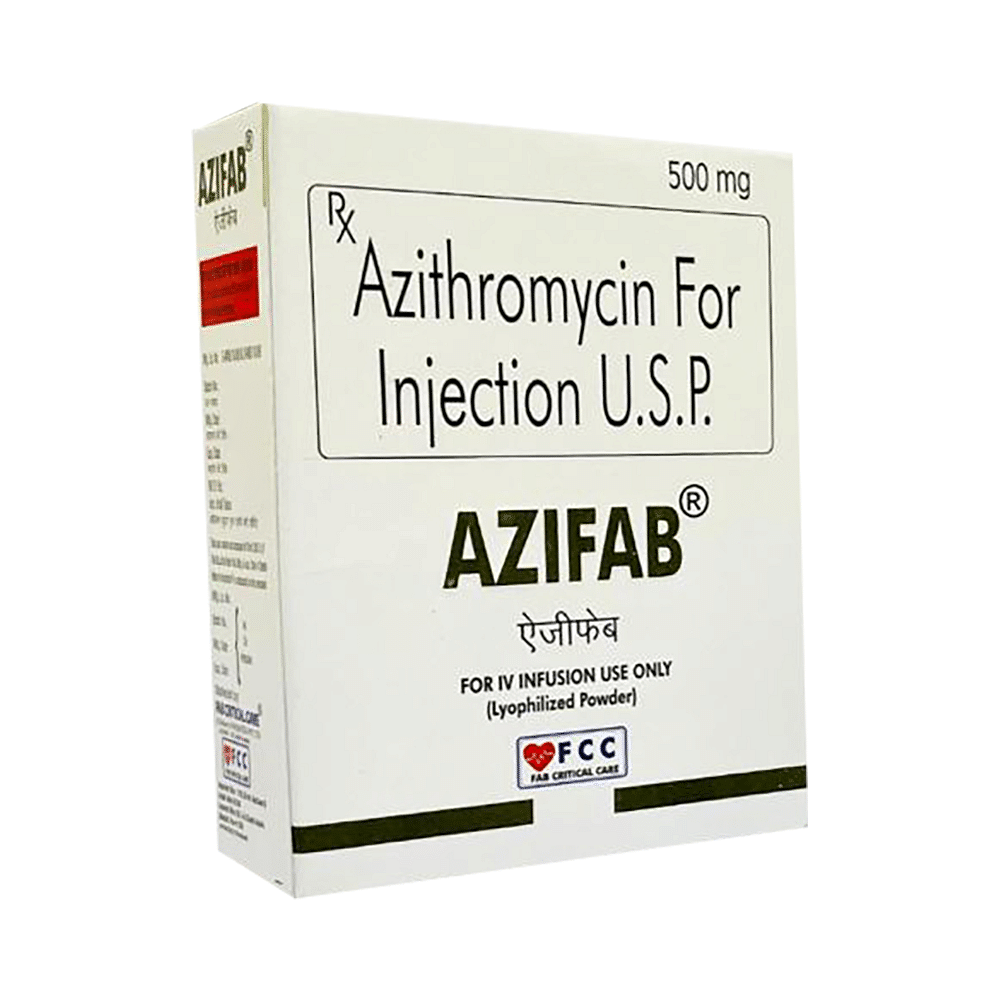
Azifab Injection
Manufacturer
Fab Critical Care
Salt Composition
Azithromycin (500mg)
Key Information
Short Description
Azifab Injection is an antibiotic used to treat various types of bacterial infections, including respiratory tract, ear, nose, throat, skin, and eye infections in adults and children, as well as sexually transmitted diseases like gonorrhea.
Dosage Form
Injection
Introduction
Azifab Injection is a broad-spectrum antibiotic effective in killing many types of gram-positive bacteria, some types of gram-negative bacteria, and other microorganisms. It is given by drip or by direct injection into a vein under the supervision of a healthcare professional. Precise dosage and duration of treatment will be decided by your doctor based on your underlying condition and response to therapy.
Directions for Use
Your doctor or nurse will give you this medicine. Kindly do not self-administer.
Safety Information
Side Effects
Vomiting Nausea Stomach pain Diarrhea Pain Swelling Redness at the site of injection
Alcohol Warning
It is unsafe to consume alcohol with Azifab Injection.
Breastfeeding Warning
Azifab Injection is safe to use during breastfeeding. Human studies suggest that the drug does not pass into the breastmilk in a significant amount and is not harmful to the baby.
Pregnancy Warning
Azifab Injection is generally considered safe to use during pregnancy. Animal studies have shown low or no adverse effects to the developing baby; however, there are limited human studies.
Interacting Medicines
Astemizole Disopyramide Ebastine Lovastatin
How it works
Azifab Injection is an antibiotic that works by preventing synthesis of essential proteins required by bacteria to carry out vital functions, thus stopping the bacteria from growing and preventing the infection from spreading.
Quick Tips
Do not skip any doses and finish the full course of treatment even if you feel better Diarrhea may occur as a side effect but should stop when your course is complete Stop taking Azifab Injection and inform your doctor immediately if you develop an itchy rash, swelling of the face, throat or tongue, or breathing difficulties while taking it
Frequently asked questions
How long does it take for Azifab Injection to work?
For most infections, you might start to feel better within a few days. It is very important to keep taking this medicine for as long as your provider told you to do so, even if you start to feel better.
Can I take Azifab Injection more than 5 days?
Depending on your infection, your doctor might prescribe Azifab Injection to you for longer than 5 days. You should take this medication exactly as prescribed by your doctor. You should always finish the full prescribed course of medication, even if you start feeling better. Skipping doses or not finishing can cause your infection to return and be harder to treat.
Can I use Azifab Injection to treat my common cold?
No, Azifab Injection cannot be used for the treatment of viral infections like common colds or flu. It is an antibiotic and works by stopping the growth of bacteria.
Which is the best form of Azifab Injection, tablet, or injection?
This medicine is available in the form of a tablet, an oral suspension solution, an eye drop, and an injection. The best type and dosage depend on the infection a person has.
Who should not take Azifab Injection?
People who are suffering from diarrhea from infection with Clostridium difficile bacteria, skeletal muscle disorder, slow heartbeat, liver problems, and with low magnesium and potassium level in blood should not use this medicine. Talk to your doctor if you are not sure.
When should I call my doctor right away?
Get medical help right away if you have signs of allergic reaction such as difficulty breathing, rash, hives, itching, and blisters. Also, let your doctor know if you experience severe stomach pain, nausea, vomiting, dark urine, pale stools, or yellowing of your skin or eyes, severe diarrhea, and any change in heart rate.
How long does azithromycin stay in your system after you finish taking it?
Azithromycin will be in your system for around 15.5 days, after the last dose.
How to get relief from diarrhea while on treatment with Azifab Injection?
Food items with soluble fiber can help relieve diarrhea as they help absorb excess fluid from the body. These food items include bananas (ripe), orange, boiled potatoes, white rice, curd, and oatmeal. Diarrhea can cause dehydration in the body, so drink 8-10 glasses of water to avoid dehydration. You can also have soups and juice frequently to hydrate yourself.
I have been prescribed Azifab Injection and I'm wondering if there are any restrictions during treatment?
Generally, it is recommended that patients taking Azifab Injection should avoid taking any antacid with this medicine as this can affect the overall effectiveness of Azifab Injection. It is also recommended to avoid exposure to sunlight or tanning beds as Azifab Injection increases the risk of sunburn.
Is Azifab Injection a strong antibiotic?
Azifab Injection is an effective antibiotic that is used for the treatment of many bacterial infections. Compared to other antibiotics, Azifab Injection has a longer half-life which means that it stays in the body for a long time because of which it is given once a day and for a short span of time. Other antibiotics comparatively have a shorter half-life and are usually given twice, thrice, or four times a day.
Can you get a yeast infection from taking Azifab Injection?
Some people may get a fungal or yeast infection known as thrush after taking Azifab Injection. Antibiotics such as Azifab Injection can kill the normal or ‘good bacteria’ of your intestine responsible for preventing thrush. You should inform your doctor if you get a sore or vaginal itching or discharge. Also, inform your doctor if you get a white patch in the mouth or tongue after taking Azifab Injection or soon after stopping it.


